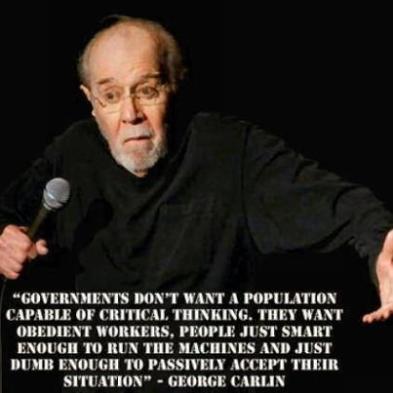What’s the point?
Do not believe in anything simply because you have heard it. Do not believe in anything simply because it is spoken and rumored by many. Do not believe in anything simply because it is found written in your religious books. Do not believe in anything merely on the authority of your teachers and elders. Do not believe in traditions because they have been handed down for many generations. But after observation and analysis, when you find that anything agrees with reason and is conducive to the good and benefit of one and all, then accept it and live up to it.
-The Buddha
When I talk to parents, other educators, students and administrators the number one response I receive when I ask what the purpose of education is, is “so they can grow up and get a good job.” Their hearts are in the right place, but this is the wrong response. The point of education is to critically think. It is not to accept the last generation’s answers to everything as the final word. It is not to support a certain political perspective. It is certainly not to support religious views. The point is to create free-thinking individuals capable of surviving, understanding and responding to our modern world.
When Horace Mann created the nation’s first public education system in Massachusetts in the early 1800s, he did so in response to a rapidly growing electorate. With more and more Americans getting the right to vote, it was reasonably thought that more Americans should have access to an education. That otherwise they could be led “astray” or make poor decisions that could wind up effecting the whole nation. The vote was considered a very powerful tool, not to be used lightly.
Education, then, was a way to level the playing field. To give regular people access to the same level of thinking enjoyed previously only by the privileged few. Most of the signers of the Constitution and Declaration of Independence were the American equivalent of landed gentry. While some (Jefferson, notably) were willing to put a great deal of trust in the people, many feared giving power to what they saw as the uneducated rabble. A free and public education was the response of the next generation of American leaders, who had listened to the previous generation, but saw limited suffrage as a great inequality.
I think, as a nation, we’ve forgotten how powerful a tool voting, and public political participation can be. Too many people treat the vote as a nuisance, when they forget that it is the people’s check on the power and activities of the government — not to mention letter writing, protest, and other Constitutionally protected tools of the people. I tell my students “if you ever have a problem with what your government is doing, look in the mirror; it’s your fault.” It’s a simplified but aggressive statement meant to remind them of the power they have, and that too few people exercise.
In terms of encouraging the type of critical thinking that the Buddha referred to over 1500 years ago, and that I believe is monumentally important to education, there is much that can be done. Too few teachers encourage true collaboration in their classes (there is a difference between collaboration — constructive discourse between students — and “group work” — five kids are assigned to a group and one kid does all the work). Too many teachers are threatened by questioning students, who they often mistake for troublemakers. Kids are naturally curious. Sometimes we forget that. I offer extra credit to students who ask deep thinking questions and then research an answer and share their research with the class, and I try to act as a guide when they bring information back. I have a spot in my classroom called the “Parking Lot.” It’s a place for abstract, non-sequitur, or deep thought questions. Kids write their question on a sticky note and I get to it when we can. They can do so anonymously if they choose.
We must encourage the next generation to “ask the question,” lest they become a generation of worksheet fillers, bubble-bubblers, and cogs. It requires patience, but it’s worth it. I keep a modified version of the Buddha’s quote on my wall, as a reminder to myself of what the point of all of this is, and as a sign to my students that they should feel comfortable asking questions in my class.
